"That dream is no longer real for me, somehow, though the landscape [of the northeast] still has a certain hold."Fortuitous of me, setting up a new blog, because recently the dream has become not just real, but concrete. We are establishing a new home base in the landscape of my childhood. And boy is that weird! Truly, I never thought to leave Colorado, but we are in full transition mode. We may not get there permanently for a while yet, but we are homeward, eastward bound.
Colorado itself has changed, and is now changing more rapidly than ever. My Foothills Fancies are changing so fast I can barely keep up. And now that the move is decided and retirement has come, I'm suddenly losing any motivation to keep up with the new version of my foothills environment.
Yes, I realize nothing is immune to change, not home territories and certainly not my personal self. I've weathered many changes, including some associated with the inevitable aging process, since last I blogged here (or anywhere). So it goes...
But as my circumboreal longings of eight years ago are poised to be realized after all, perhaps this is the place to record the new landscapes of life and, we hope, our adaptation to them.

